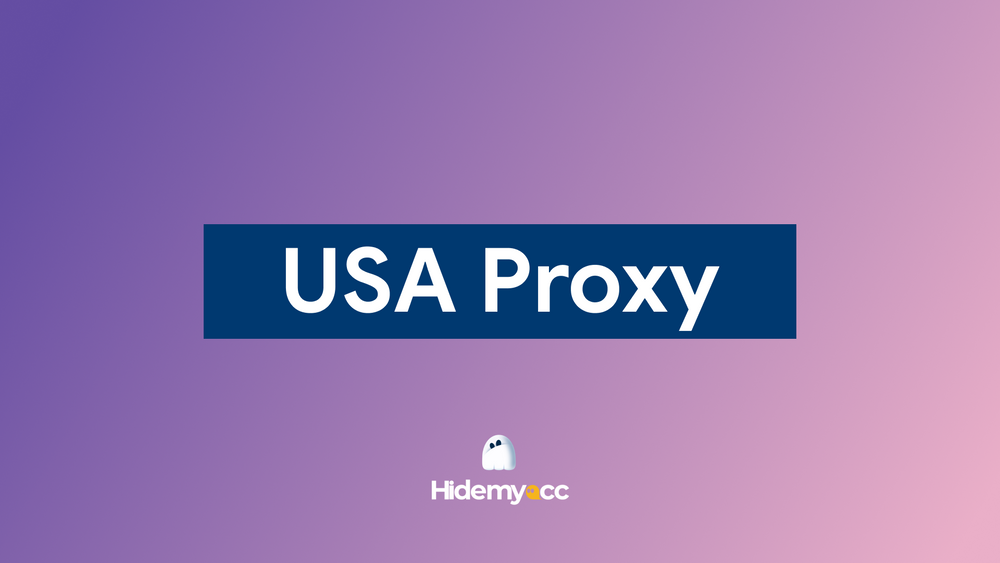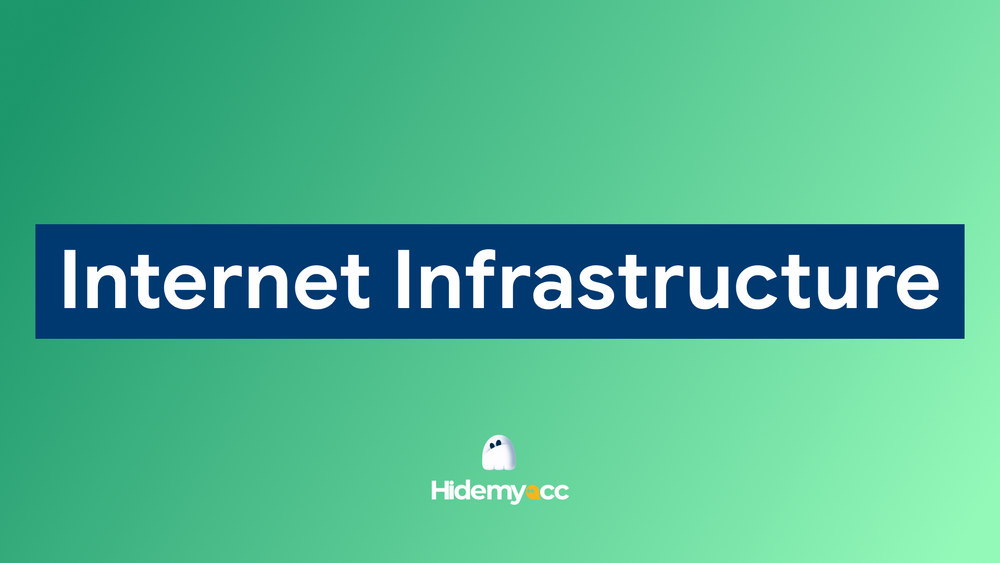We all use the Internet every day, but how many of us actually know what an ISP is? If you’ve ever wondered who makes your Internet connection possible, how it works, and why some networks feel faster than others, this guide is for you. By the end, you’ll have a clear understanding of what an ISP does and how to make smarter choices when it comes to your Internet connection.
1. What is ISP?
So, let’s start with the basics: What is ISP? ISP stands for Internet Service Provider. In simple words, it’s the company that connects your home, phone, or computer to the Internet. Without an ISP, you wouldn’t be able to browse websites, stream videos, or chat online. Think of an ISP as a bridge that links your device to the giant global network we all call the Internet.
ISPs do more than just provide the connection. They maintain networks, manage traffic, assign IP addresses, and sometimes even offer extra services like email, web hosting, or cloud storage. The key point is: without an ISP, you’re basically offline.
2. How ISPs work: Simple explanation
You might wonder: how does your Internet Service Provider (ISP) actually get the Internet to your device? Here’s a simple, step-by-step breakdown of what they do:
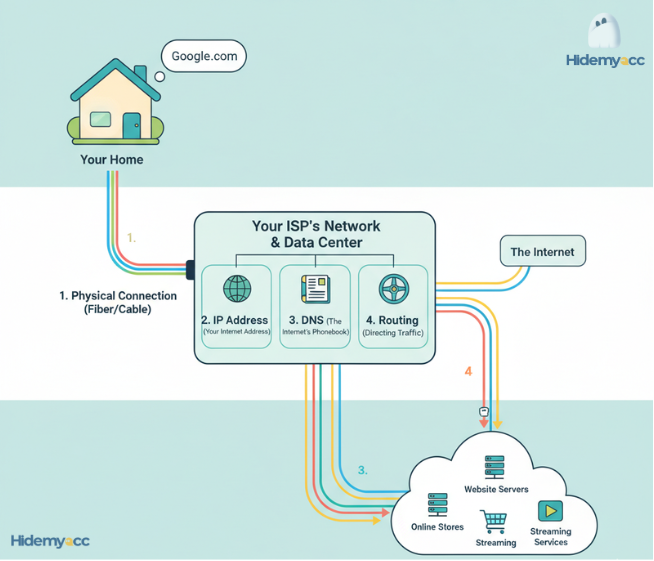
2.1. Providing the physical connection
Your ISP is responsible for laying the "road" that the Internet data travels on.
- What they do: They run a physical line (a cable or wire) directly into your home or office.
- The "Roads": This connection can be a coaxial cable (the same kind used for cable TV), a thin fiber optic cable (which uses light signals for fast speeds), or a standard phone line (DSL).
- The Result: This physical setup is what connects your modem (the box in your house) to the much larger network of the ISP. Without this physical link, your computer can’t "talk" to the rest of the world.
2.2. Giving you an address (IP Address)
The Internet is a huge place, and to send and receive information, you need a specific location.
- What they do: Your ISP assigns a unique IP Address (like 203.0.113.4) to your connection. Think of this as your home’s mailing address on the Internet.
- Why it Matters: When you request to see a webpage, the server that holds the page needs to know exactly where to send the data back. Your IP address tells the Internet: "Send the information here!"
2.3. Being the internet's phonebook (DNS)
You use easy-to-remember names like https://www.google.com/search?q=google.com or facebook.com, but computers only understand numbers (IP addresses).
- What they do: ISPs manage the DNS (Domain Name System). The DNS is basically the phonebook of the Internet.
- How it Works: When you type "wikipedia.org," your computer asks your ISP's DNS server: "What is the IP address for wikipedia.org?" The DNS server instantly provides the numeric address, allowing your device to find and load the correct website.
>>> Related article:
- Understanding DNS: The Backbone of your online experience
- VPN Download Guide: How to Choose and Install the Best VPN
- Internet infrastructure: What it is and why it matters
2.4. Directing traffic (Routing)
Once your request leaves your house, it needs guidance to reach its final destination.
- What they do: The ISP owns and operates massive, powerful equipment called routers. These routers act like traffic cops on the Internet.
- The Process: When you click a link, your request travels from your home modem, through the ISP’s network, and then is routed (sent along the most efficient path) across the world to the website's server. Once the server sends the data back, the ISP routes it all the way back to your IP address.
- Speed: This entire trip-out and back-happens extremely fast, often in milliseconds.
The bottom line is that your ISP is the middleman that manages the physical infrastructure, assigns your location, translates names, and directs the traffic so you can access everything online.
3. Types of ISPs: Which "road" are you on?
Not all Internet connections are the same. Your Internet speed and reliability depend on the type of physical technology your ISP uses to connect you. Think of these as different types of roads that your data travels on:
3.1. DSL (Digital Subscriber Line)
- The Technology: Uses the existing copper telephone lines that are already installed in most homes.
- Simple Analogy: The Country Road. It's already there and goes everywhere, but it's a bit slow.
- Good For: Basic browsing, checking email, and small households.
- The Catch: Your speed drops the farther away you live from the ISP’s central office. It’s generally the slowest option.
3.2. Cable
- The Technology: Uses the same coaxial cables that deliver cable television to your house.
- Simple Analogy: The Main Street. It's wider, carries more traffic, and is generally faster than the country road.
- Good For: Households with multiple people, streaming video (like Netflix), and basic online gaming.
- The Catch: Speeds can slow down during peak evening hours if too many neighbors are using the Internet at the same time (like rush hour traffic).
3.3. Fiber Optic
- The Technology: Uses thin strands of glass or plastic (fiber) to transmit data using light signals.
- Simple Analogy: The High-Speed Bullet Train/Superhighway. It’s the fastest and most efficient way to travel.
- Good For: Everything! Professional work from home, serious online gaming, 4K streaming, and families with many connected devices.
- The Catch: Installation can be expensive, and it's not yet available everywhere because the ISP must lay brand new fiber cables in your area.
3.4. Satellite
- The Technology: Uses a dish (installed at your home) to communicate with satellites orbiting Earth.
- Simple Analogy: The Remote Airstrip. It can reach places no roads or cables go.
- Good For: People living in very rural areas where DSL or cable lines haven't been installed.
- The Catch: Often has slow speeds and high latency (delay), which makes real-time activities like gaming or video calls difficult. It is also often affected by heavy rain or storms.
3.5. Mobile / 5G
- The Technology: Uses the same cellular networks that your smartphone connects to (like 4G LTE or 5G).
- Simple Analogy: The Portable Hotspot. You can take it anywhere the cell signal reaches.
- Good For: Portable devices, temporary connections, and using the Internet on the go.
- The Catch: Connection quality depends entirely on the cell tower signal strength, and you often have data limits.
Summary: For most people, Cable offers the best balance of speed and cost. If you can get it, Fiber is the best choice for speed. If you live far out in the country, Satellite might be your only choice.
4. ISP Tiers: Understanding the internet's hierarchy
Have you ever wondered why your local Internet Service Provider (ISP) can connect you to a small website in a different country? It's because the Internet is structured in a hierarchy of networks called Tiers.
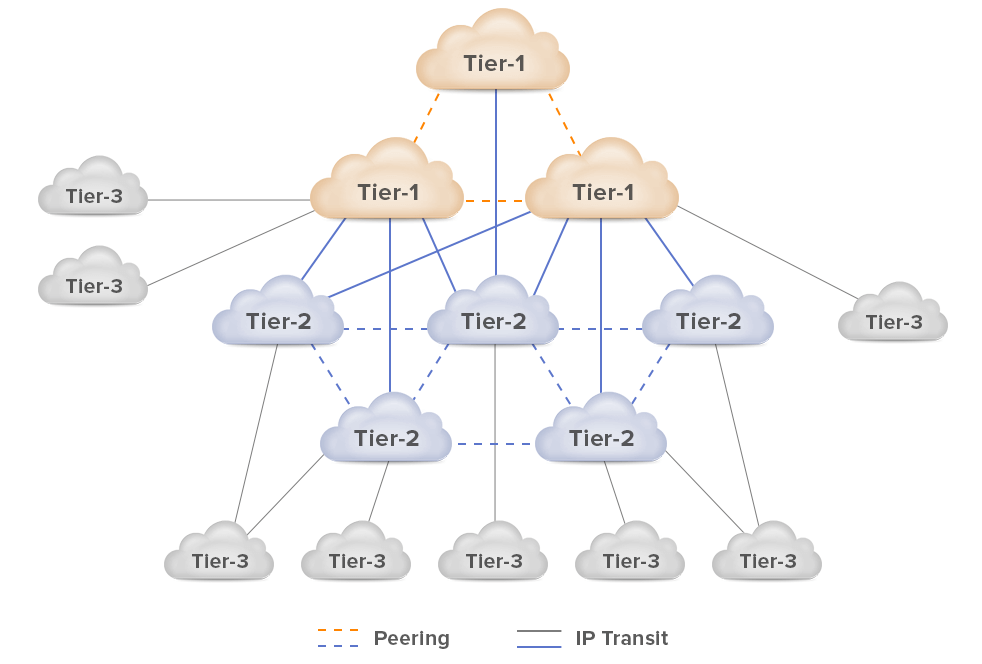
Tier 1: The global owners
These are the giants of the Internet world. Tier 1 providers are massive companies that own the backbone infrastructure, which includes the vast network of underground and undersea fiber optic cables spanning continents. They have built their networks so thoroughly that they can reach every other network on the planet without paying anyone else for access.
Tier 1s participate in peering, meaning they agree to exchange data with all other Tier 1 providers for free. They are the top of the food chain.
Tier 2: The regional connectors
Tier 2 ISPs are the mid-sized providers, and they are the companies most people often recognize. They cover large regions, states, or entire countries and serve a huge number of homes and businesses. They don't have the truly global reach of a Tier 1 network, so they have to operate using a mixed system.
A Tier 2 will peer (exchange data for free) with other Tier 2s of a similar size, but crucially, they must pay Tier 1 providers for access (called "transit") to connect to the rest of the worldwide Internet. This ensures their customers can reach any site, anywhere.
Tier 3: The local access providers
These are the smallest, local providers. Tier 3 ISPs focus on a specific, small geographical area - a city, town, or neighborhood. They are the company responsible for running the final physical line (cable or fiber) directly into your house. They are the last stop before you connect.
Since their network is purely local, Tier 3 ISPs must pay Tier 2 (and sometimes Tier 1) providers for all their Internet access. Without these payments, they couldn't route your requests past your town.
5. Extra services your ISP might offer
Your Internet Service Provider (ISP) does more than just get you online. Because they already have the connection into your home, many ISPs offer a variety of convenient extra services that might simplify your life or save you money. Knowing what these extras are can help you choose the best provider for your needs.
5.1. Bundled Services
The most common extra service is bundling. Since many ISPs started as phone or cable companies, they often combine all three services into one bill:
-
TV Service: They can deliver hundreds of television channels right alongside your Internet connection.
-
Home Phone (Voice): This is often a modern Voice over IP (VoIP) phone service, letting you keep a landline without the traditional phone company.
Choosing a bundle can often lead to lower overall monthly costs than buying each service separately from different companies.
5.2. Digital Tools and Protection
Beyond basic connectivity, many ISPs provide tools to help you manage and protect your digital life:
-
Email Accounts: Some providers offer free email addresses that are linked to your service (like
[email protected]). -
Cloud Storage: You might get a small amount of free cloud storage to back up important files, photos, or documents online.
-
Security and VPNs: To keep your data safe, your ISP might offer their own Virtual Private Network (VPN) service or antivirus/security software to install on your devices. This helps protect your information while you browse the web.
5.3. Web and Business Services
If you run a small business or want to host a personal website, your ISP may be able to help with that, too:
-
Web Hosting: They might offer space on their servers to host your website, making it accessible to the world.
- Domain Name Registration: You may be able to register and manage your website's domain name (like
mybusiness.com) directly through your provider.
Ultimately, these extra services can be a major factor when you're comparing ISPs. If you need a new TV package or want simple online security, choosing a provider that offers a good bundle or service add-on can be a very practical decision.
6. How to measure ISP quality (What to look for)
When you’re trying to pick a new Internet Service Provider (ISP), it’s not just about the price. You need to know how well the service actually works.
6.1. Speed: How fast can data move?
Speed is the most obvious factor. This determines how quickly you can download files, load videos, or upload photos. There are two main parts to speed:
Download Speed: This is how fast data moves from the Internet to your device. A high download speed means videos stream without stopping (buffering) and webpages load instantly.
Upload Speed: This is how fast data moves from your device to the Internet. This is important for video calls, sending large email attachments, and putting photos on social media.
You can easily measure this using free online speed tests. Make sure the speeds you are getting match the speeds the ISP promised!
6.2. Latency: The time delay
Latency is a measure of delay. Think of it as the time it takes for your request to go from your computer to the server and back again. It's measured in milliseconds (ms).
Why it matters: Low latency is critical for anything that requires quick, real-time feedback. If you are a gamer or use video conferencing, you want very low latency. High latency results in "lag" in games or delays during video calls.
The Goal: A good connection should have latency that is as low as possible (ideally under 50 ms).
6.3. Reliability: Does it stay connected?
A fast connection isn't helpful if it constantly cuts out. Reliability measures how often your Internet connection drops or slows down unexpectedly.
Ask the ISP about their track record. How often do customers report outages? A good ISP works hard to keep its service stable.
The Extras: The very best ISPs might offer backup systems or multiple data paths so that if one connection fails, you immediately switch to another and barely notice the problem.
6.4. Customer service
Even the best connections sometimes have issues. When that happens, you need help fast.
An ISP's quality is also measured by how quickly and easily you can reach a human being when something goes wrong.
Good service: This means short wait times, knowledgeable technicians, and the ability to schedule repairs quickly. Poor customer service can turn a minor outage into a major headache.
>>> Read about IP address
- What is my IP address? How it works and how to change it
- What is a Private IP Address? Benefits and Uses Explained
- IPv4 address Explained: Everything You Need to Know
- What is IPv6 Addresses? What They Are and Why They Matter
-
Static IP vs. Dynamic IP Addresses: Key Differences Explained
7. ISP privacy and risks
Your ISP acts like the operator of the road leading to your house. They always see every digital "car" that travels in and out. They constantly record the IP address of every website server you connect to. This is how they know which websites you visit and when you visit them. Even if a site is secure, your ISP still sees the connection itself. They also meticulously track how much data you use for downloading and uploading. This constant collection of data about your online destinations builds a very detailed profile of your habits.
7.1. Throttling
Throttling occurs when an ISP intentionally slows down certain types of data. Imagine you have a fast internet highway, but the ISP decides to create a traffic jam just for big trucks—which in this case are your high-bandwidth activities like 4K streaming or large file downloads. They usually do this to manage network congestion and ensure everyone gets a baseline speed, but the result is that you might not get the full speed you paid for when you need it most.
7.2. Net Neutrality
The principle of Net Neutrality argues that all data traveling across the internet should be treated equally. This means an ISP shouldn't be allowed to slow down content from one company (perhaps a competitor) or speed up content from another company (a partner who pays them more). When net neutrality rules are weak or removed, ISPs could potentially prioritize certain websites or services over others, possibly making your experience worse for the services they don't favor.
7.3. How to protect your activity
Since your ISP can see where you go, the best way to hide your activity is to use tools that obscure your data. The strongest defense is a Virtual Private Network (VPN). A VPN works by encrypting (scrambling) all your data before it even leaves your computer. To your ISP, all your online activity simply looks like one secure, encrypted connection to the VPN server, so they cannot tell which specific websites you are visiting. Additionally, always look for the lock icon and ensure you are using HTTPS websites, which prevents your ISP from being able to read the content of your communication, like passwords or messages. Being aware of these risks helps you make smarter choices and take control of your privacy online.
8. Choosing the right ISP
Picking an Internet Service Provider (ISP) can feel overwhelming, but it doesn't have to be. Instead of just picking the cheapest or fastest option, you need to find the one that fits your home and your lifestyle.
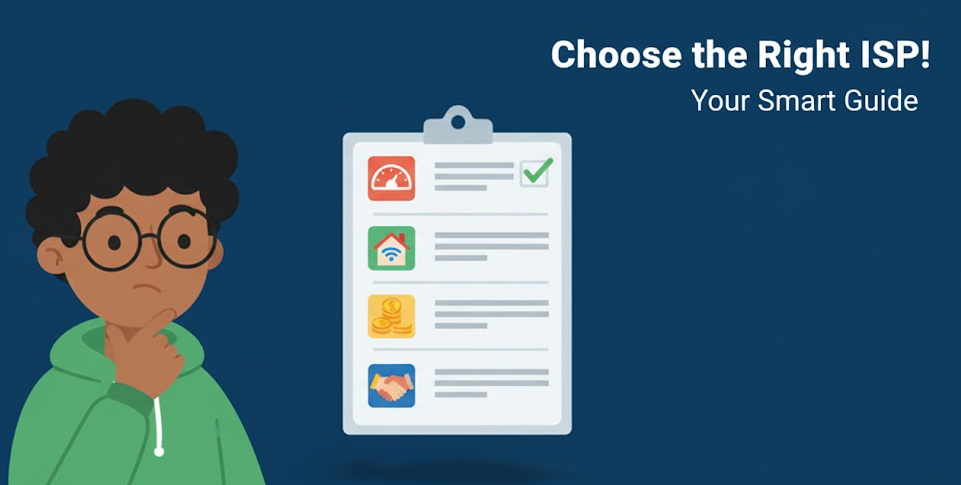
8.1. Know your needs and usage
Before looking at plans, look at how you use the internet. Ask yourself: Are you a casual browser or a heavy user? If you primarily check email and social media, a basic DSL or a slower cable plan will probably be enough. If you have multiple people streaming 4K video, doing video calls for work, or online gaming, you'll need higher speeds, usually from a fast cable or a Fiber Optic connection. Knowing your usage helps you avoid paying too much for speed you don't need, or worse, getting service that is too slow.
8.2. Check coverage and speed availability
The first technical hurdle is simply knowing which ISPs can physically connect to your home. Not every provider has built lines to every neighborhood. You must enter your exact address on the ISP's website to see what service types (Fiber, Cable, DSL) are actually available to you. Once you know who covers your area, check the download and upload speeds they can guarantee for the price. Never assume you'll get the maximum advertised speed; ask about typical speeds in your area.
8.3. Compare the full package and price
After checking the technical details, it's time to compare costs. But look beyond just the monthly fee: many ISPs offer combined deals with TV or home phone service. If you need those, a bundle might save you money. Always check for equipment rental fees (for the modem and router), installation charges, and data caps (limits on how much data you can use monthly). Sometimes a cheaper monthly rate comes with high fees elsewhere.
8.4. Read reviews and test the quality
The numbers on the website don't tell the whole story. You need to know what real customers are experiencing:
- Customer reviews are the best place to find out how often the service goes down. A provider may be fast, but if it's constantly unreliable, it's not a good deal.
- Customer Service: If something breaks, how fast can you get help? Poor customer support can turn a small technical issue into a huge headache.
- Test Before Committing: If possible, look for ISPs that offer a short-term trial or a contract with a generous cancellation period so you can test the latency and real-world speed before you are locked into a long-term contract.
Remember, the fastest advertised speed isn't always the best service. You need a balance of speed, high reliability, and responsive customer support to truly enjoy your internet connection.
9. Conclusion
So now you know what an ISP is, how it works, and why it matters. Choosing the right Internet provider isn’t just about speed. It’s about reliability, privacy, and the services that make your online life easier. Next time you pick an Internet plan, remember: your ISP is more than just a connection. It’s the bridge to the online world so choose wisely and stay informed.
10. FAQ
1. What does my ISP mean?
Your ISP means Internet Service Provider - the company that gives you Internet access.
2. How do I fix my ISP connection?
Restart your router, check cables, or contact your ISP if the issue continues.
3. Is my ISP tracking my data?
Yes, most ISPs can log websites you visit and data usage unless it’s encrypted.
4. Can my ISP see what I'm googling?
They can see that you’re using Google, but not the exact searches if you use HTTPS.
5. How do I delete my ISP history?
You can’t delete history stored by your ISP, but you can hide future activity using a VPN.
6. How to block ISP tracking?
Use a VPN, encrypted DNS, and always browse on HTTPS websites.
7. How long does ISP keep history?
It depends on local laws and the ISP - anywhere from a few months to several years.


